
by Victoria Silverwolf
Patience is a Virtue
If you're like me, you look forward to the arrival of the latest issues of your favorite magazines at the local newsstand. You carefully calculate the exact day they'll show up and get there ahead of time, eager to meet the delivery person who loads all the publications off the truck. There they are, ready for the metal wires that hold them together in bundles to come off so they can go on display.
You may understand my consternation, then, when Worlds of Tomorrow failed to make an appearance on the scheduled date last month. Since it's a relatively new magazine, I figured that, like so many other science fiction publications, it was out of business.
Imagine my delight when I saw it again, thirty days later. Why the delay? Let me hand the microphone to editor Frederik Pohl, who can explain the situation better than I can, and who will also offer us a preview of the next issue.
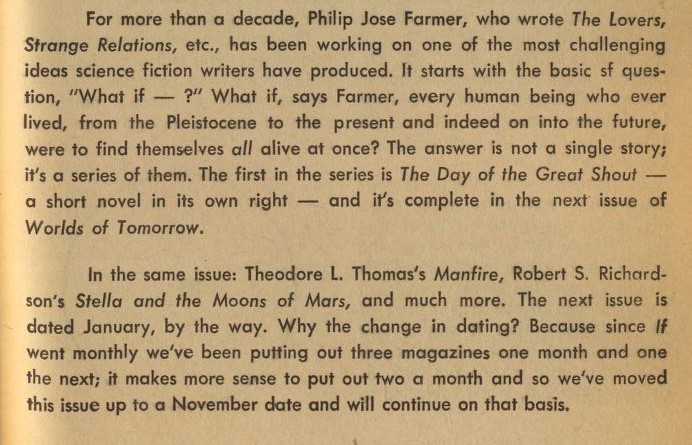
Thanks for clearing that up, Fred. Now let me take a look at the contents of the current issue.
Better Late Than Never
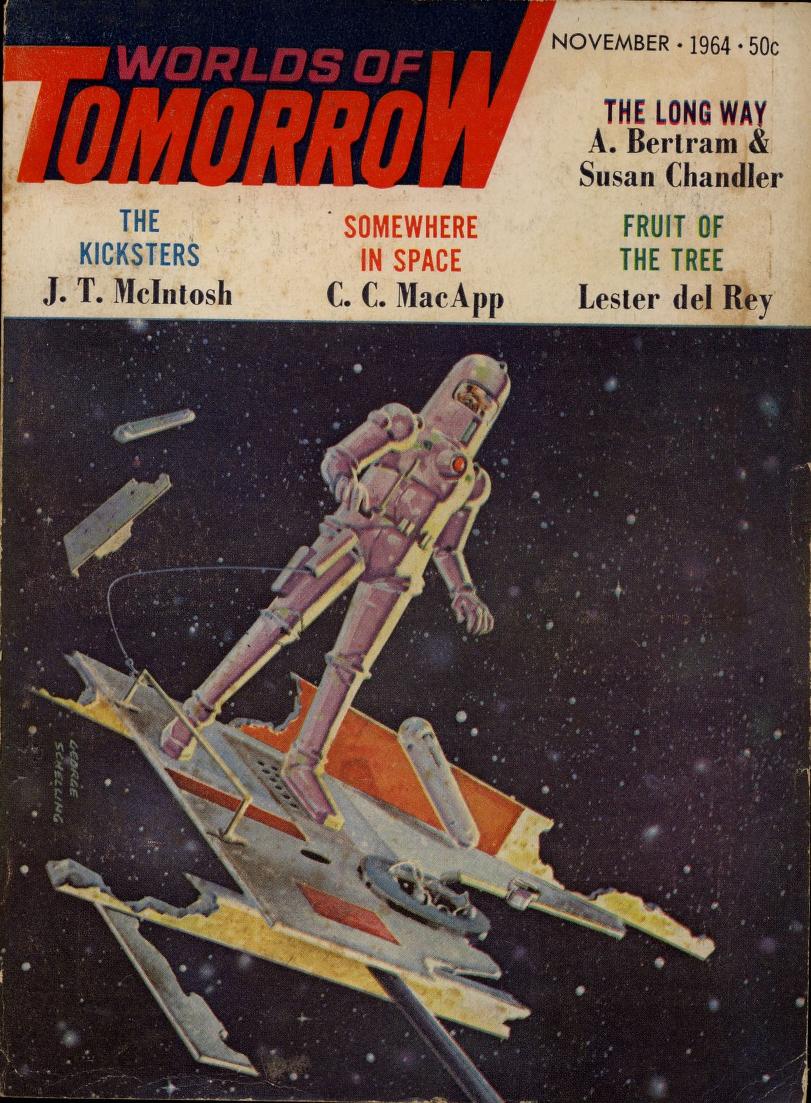
Cover art by George Schelling
Killer!, by Robert Ray
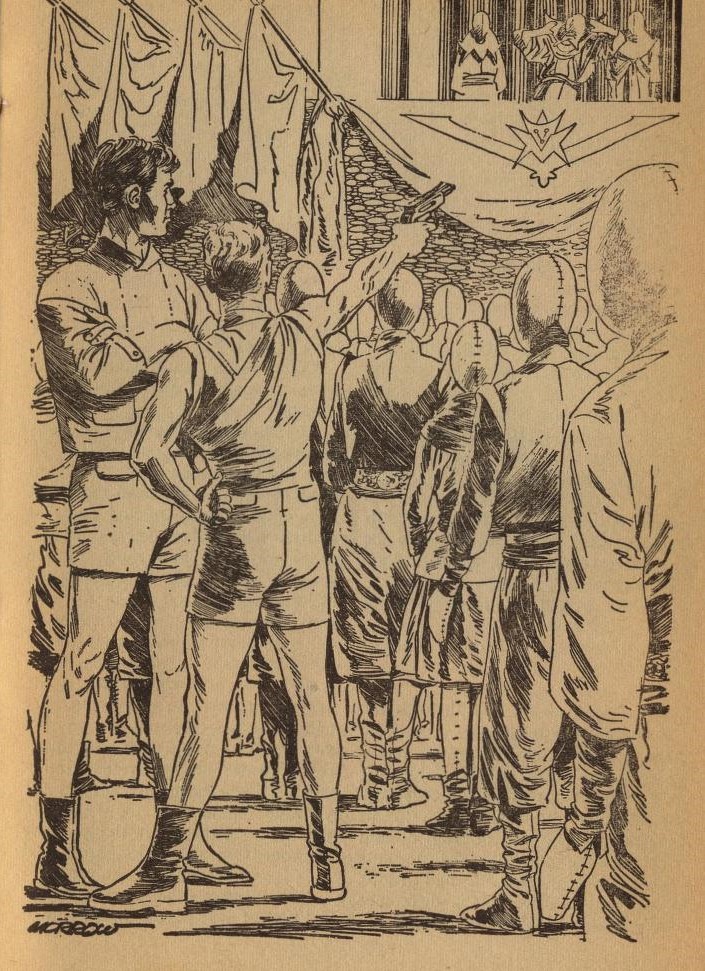
Illustrations by Gray Morrow
Taking up one-third of the magazine is a novella by an author new to me. The gentleman with the gun, pictured above, is trained as an assassin by the taller man standing next to him, his half-brother. There is no love lost between the two. The intended target is the newly arisen dictator of a planet populated by very human aliens. (The only important difference between the two species is that the aliens are all short, light-skinned, and fair-haired. In this future, almost all human beings are tall, dark-haired, and have black or dark brown skin. Our antihero happens to be one of the rare persons who resemble the aliens.)
The agency for which the half-brothers work believes that the dictator poses a threat to Earth, even though his species does not yet have space travel. If that seems paranoid, well, so do nearly all the characters in this grim story.

The target.
The assassin's mission is to disguise himself as an alien and use a local weapon to kill the dictator, so Earth won't be blamed. What he doesn't know, but the reader does, is that the agency planted a hypnotic suggestion in his brain, so that he will kill himself immediately after the assassination.

Surfing down to the planet.
As soon as he arrives on the alien world, things go wrong. The dictator's forces are far more powerful and technologically advanced than the agency thought, thanks to the secret intervention of another species of alien. (They aren't quite so human, thank goodness, so we can keep track of who's doing what.)

The hero in typical form, about to knock out an innocent bystander.
What follows is an extended series of captures, escapes, chases, and violent battles. The protagonist, formerly ready to murder without qualms, slowly develops a conscience after he kills several aliens.
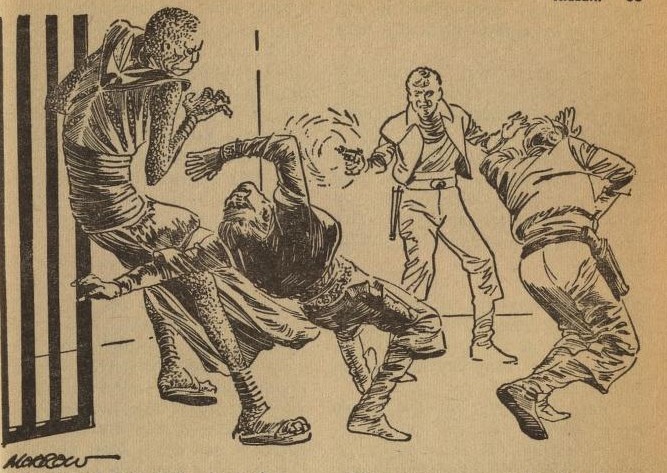
Take that, alien scum!
He eventually figures out that he's been set up as a sacrificial lamb, and tries to carry out his mission while staying alive. It all leads up to a very dark ending.
This is a fast-moving, action-packed spy adventure, with plenty of twists and turns in the plot. It's a quick read for its length, although some of the author's sentences are a little clumsy. The story's cynical view of espionage reminds me of last year's bestselling novel The Spy Who Came in from the Cold, by John le Carré, although I certainly wouldn't say it's as good. Worth reading, but not a classic by any means.
Three stars.
Natural History of the Kley, by Jerome Bixby
This mock article deals with microscopic intelligent beings who live on animal hairs. Humans only find out about them after they've been wiped out by a substance that kills all animal parasites on Earth. The mood changes from black comedy and satire to sheer silliness, as the author treats us to a series of groan-inducing puns. It's inoffensive, and not as bad as a Feghoot, but that's about the best I can say.
Two stars.
The Long Way, by A. Bertram Chandler and Susan Chandler

Illustration by Norman Nodel
A male space explorer and a female artist at a nudist colony, not quite romantically involved, meet a fellow who believes in dowsing. He's able to demonstrate the procedure successfully. (It seems that dowsing works better when you're naked.) Convinced that there's something to it, the spaceman does his own dowsing, in order to find a missing earring for the artist. Because the earring is shaped like a star, and the man is thinking about interstellar travel at the time, they wind up very far from home indeed. They are able to make their way back to Earth by doing some more dowsing, but things don't turn out the way they hope.
This collaboration between a well-known author and his more obscure wife isn't very convincing, as you can probably tell from the above synopsis. The theme of dowsing makes me wonder if it was intended for the pages of Analog. I think even John W. Campbell, Jr., would reject the premise as too unbelievable. The twist ending adds another layer of implausibility.
Two stars.
The Kicksters, by J. T. McIntosh
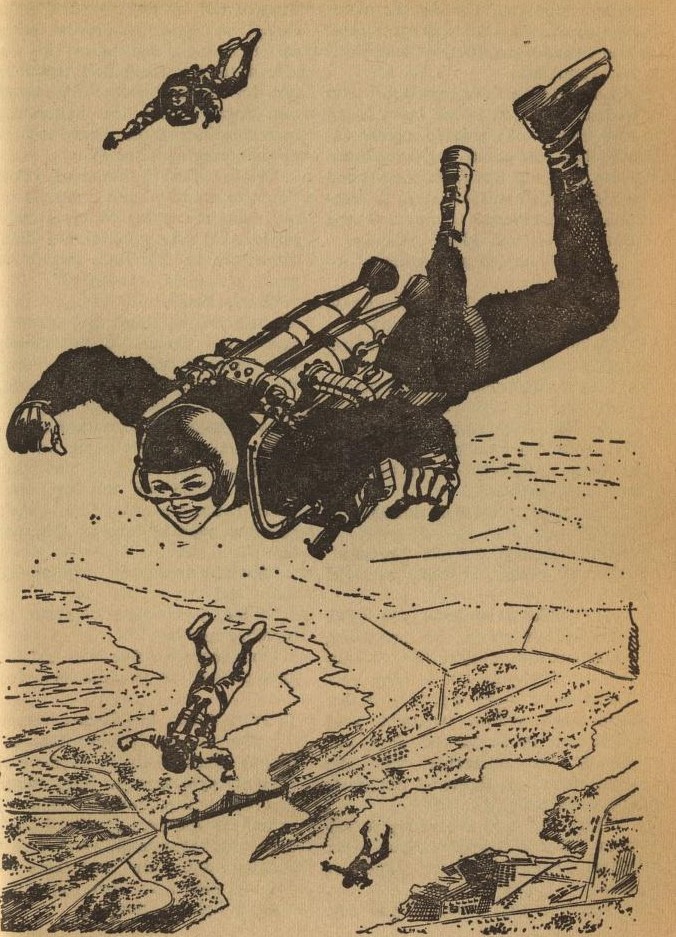
Illustrations by Gray Morrow
A group of thrill-seeking teenagers, the sons and daughters of the wealthy, play dangerous games of chicken to see who's the bravest. Their latest competition, as shown above, involves free-falling from a great height while wearing a jet pack. The trick is to turn on the jets at the last possible moment, in order to avoid being smashed into a pulp.
The boldest of the gang is a girl named Peach. Bored with risking her life in the usual ways, she decides on an even more hazardous prank. She and her boyfriend, who tries to convince her to drop the whole thing all the way through the story, travel to the Moon under false identities. She sneaks into the main jet of a spacecraft ready to return to Earth. The ship doesn't use the main jet until it's about to land, so she'll be able to survive inside a spacesuit. The joke is to force the ship to turn around and land on the Moon again. (It doesn't need to use the main jet in the lesser gravity of the satellite.)
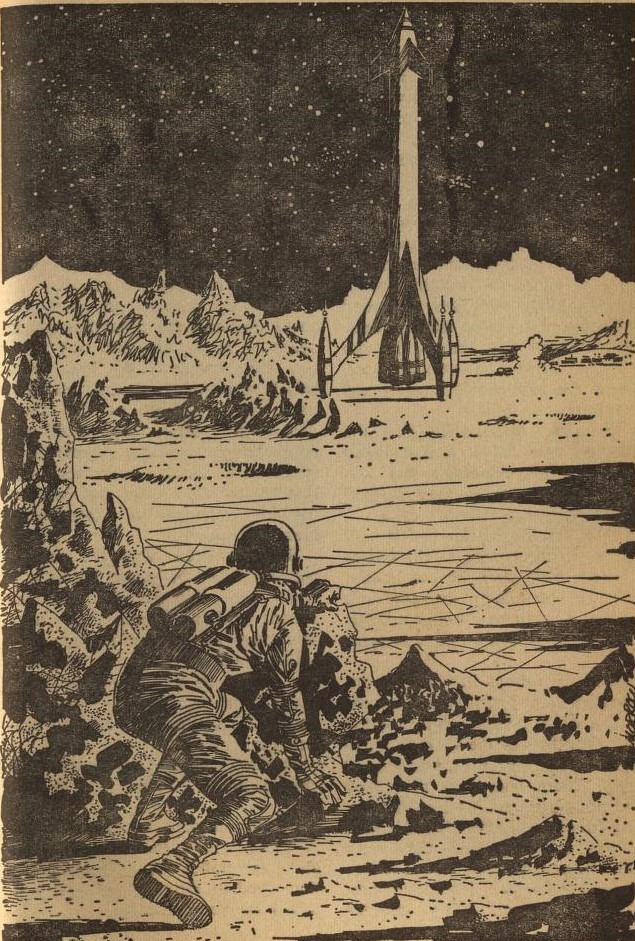
Peach, approaching the ship unseen.
The captain of the spacecraft hates spoiled brats, particularly female ones. Since he doesn't have absolute proof that anyone is inside the main jet, even though Peach's boyfriend, as planned, lets everybody know, he refuses to delay his journey to Earth. The second-in-command, desperate to save the girl's life, comes up with various plans, but all of them prove to be impossible. It seems as if Peach is doomed.
The sense that the laws of physics are conspiring to kill the heroine reminds me of the famous story The Cold Equations by Tom Godwin. The story creates genuine suspense as to whether the protagonist is going to live or die. I'll admit that the situation is a bit contrived, but I have to give the author credit for thinking up all possible objections to the premise, and answering them in a logical fashion. Peach, although definitely foolhardy and selfish, also manages to be appealing in some ways. The captain and the second-in-command also turn out to be more complex characters than they might seem at first.
Four stars.
The Carson Effect, by Richard Wilson

Illustration by Norman Nodel
At first, this story seems to be nothing but a series of unrelated vignettes. A newspaper reporter struggles over the writing of an article about something that hasn't happened yet. A man, desperate for money to pay for his wife's operation, makes a feeble attempt at robbing a bank, only to have the teller give him much more cash than he demands, without a word of argument. A woman nervously asks her employer for a small amount of money to make up for the taxi she had to take to perform an errand, and winds up getting hundreds of dollars and the rest of the day off. A six-year-old boy thinks he can buy an extremely expensive brooch for his mother from Tiffany's, and the clerk gladly sells it to him for one dollar. The President of the United States resigns his office, turning it over to the Vice President, who is obviously unfit for the job.
We return to the reporter and discover the reason for these strange events, which I won't reveal here. I also won't talk about the ironic ending, which changes everything that happened before. Suffice to say that the story looks at a very big event from several very small perspectives, and does so in an effective manner.
Four stars.
The Fruit of the Tree, by Lester del Rey
This issue's non-fiction article speculates about the possibility of altering the genetic characteristics of living organisms. By 1980, the author believes, we'll be able to produce fruits and vegetables that will stay edible, without refrigeration, for many years, and even have flavors previously unknown. We'll be able to get edible nuts, maple and/or latex sap, and lumber, better than any used today, from a single tree. New kinds of animals will appear, supplying carnivores with novel cuts of meat. (Vegetarians, like myself, will have plants that taste exactly like meat. I'm not sure I want that.) Scientists will create replacement organs, grown from scratch, for those suffering from disease.
The author lets his imagination run wild, coming up with a lot of ideas for science fiction stories, if nothing else. I doubt I'll see all these wonders a mere sixteen years from now, but I could be wrong. Even if it's hard to believe everything this essay says, it makes for interesting reading.
Three stars.
Somewhere in Space, by C. C. MacApp
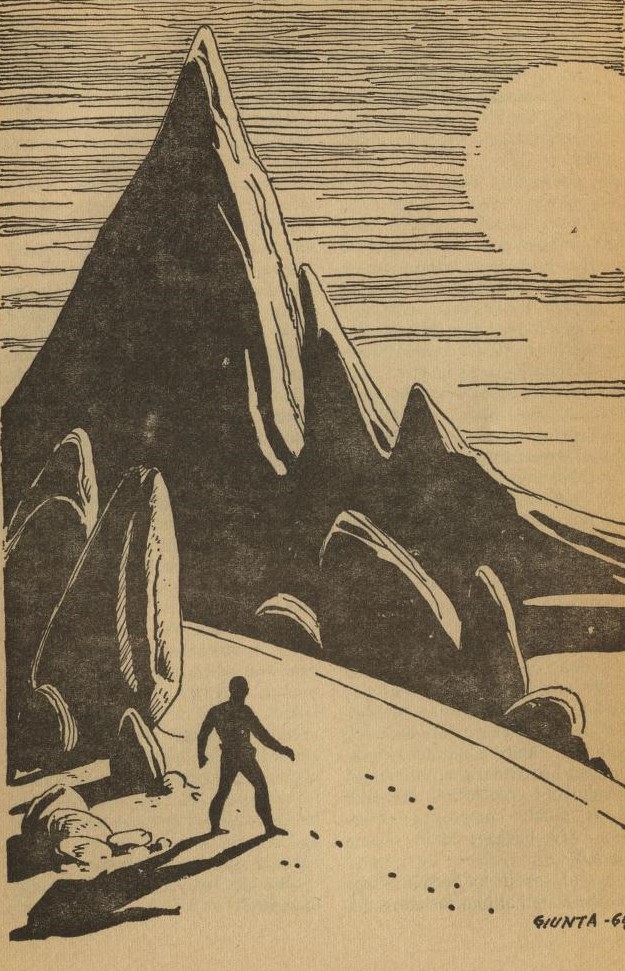
Illustrations by John Giunta
Some time before this story begins, people found alien teleportation technology on Mars. Since then, it's been used routinely, with few problems. Up until now, that is. Without explanation, folks without close relatives or friends disappear into thin air after using the teleportation device. The protagonist is a technician who accepts the dangerous but extremely lucrative assignment of figuring out what's going on. Not only does he know as much about the technology as any human being can, he's another loner, expected to vanish when he goes inside the machine.
He winds up on an unknown planet, naked and without any of his equipment. There to meet him is a very human alien, a young woman whose only differences from a human female are the fact that she has no thumbs, and that her skin is an odd color. She's one of the slaves that another group of aliens kidnap from all over, including Earth. (Our hero is very lucky that the slavers aren't around to grab him. They happen to be at some kind of celebration, getting drunk.)
With the help of the woman, the protagonist gets away from the slave facility, facing the challenge of surviving on a strange, alien world. Things get really weird when he reaches a mountain, which is really an ancient, all-powerful being, able to take on any form it pleases.
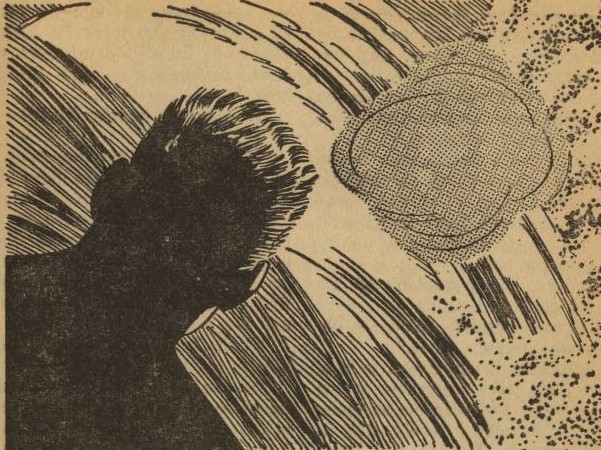
The ball of light the mountain uses to communicate with the man.
After many adventures, and falling in love with the alien woman, the hero battles the slavers against seemingly impossible odds, using only simple weapons like rocks and wooden spears. Can he possibly defeat the Bad Guys, return to Earth, and win the Girl? Well, maybe with a little help from a deus ex machina, in the form of a god-like mountain-being.

Chaos at the slave camp.
You might be able to tell from my tone that I found it hard to take this wild adventure seriously, although it's certainly not intended as a comedy. The nonstop mishaps that the hero faces kept me reading, even if I didn't believe a second of it. The mountain, alien, god, or whatever you want to call it, is the most interesting character. Although it reminds me of the lead novella in some ways, it's got a much more optimistic mood.
Three stars.
Worth Waiting For?
So, did the delay in receiving this issue have any effect on my reaction to it? Did I have high expectations that it failed to meet? Or, did I assume that the extra month would sour me on the magazine, so that I wouldn't be able to fully enjoy it?
None of the above, really. This is a typical issue. A couple of decent, if not great, adventure yarns; a couple of good stories; a couple of poor stories; and a so-so article. Good enough for half a buck, I'd say.
I guess biding my time until it appeared paid off. It's better than, say, waiting around for somebody who never shows up.


![[September 16, 1964] The Waiting Game (November 1964 <i>Worlds of Tomorrow</i>)](https://galacticjourney.org/wp-content/uploads/2019/09/worlds_of_tomorrow_196411-3.jpg)
![[September 8, 1964] It's War! (The October 1964 <i>Galaxy</i> and the 1964 Hugos)](https://galacticjourney.org/wp-content/uploads/2019/09/640908cover-672x372.jpg)
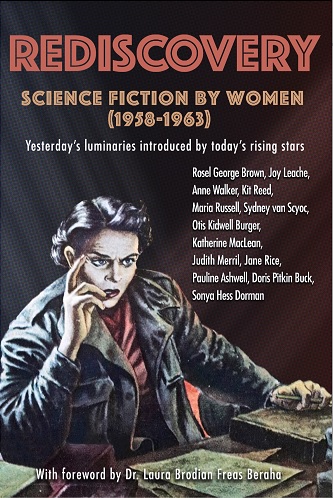










![[July 16, 1964] Un-Conventional (August 1964 <i>Galaxy</i>)](https://galacticjourney.org/wp-content/uploads/2019/07/640716cover-398x372.jpg)

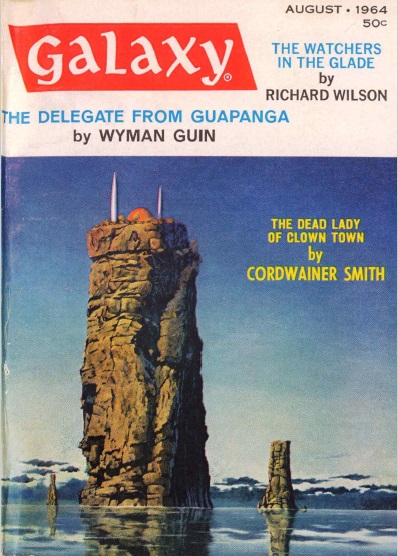
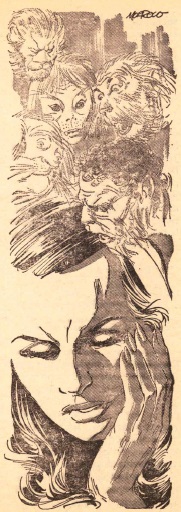
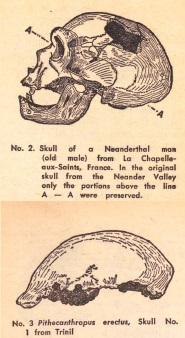
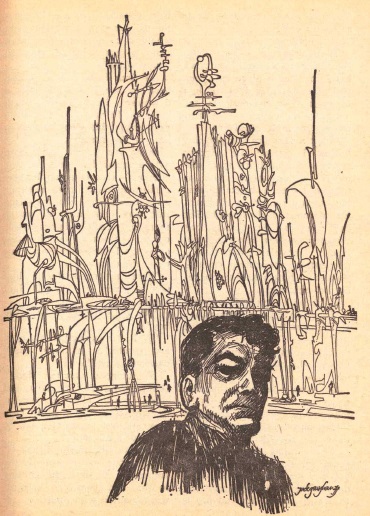
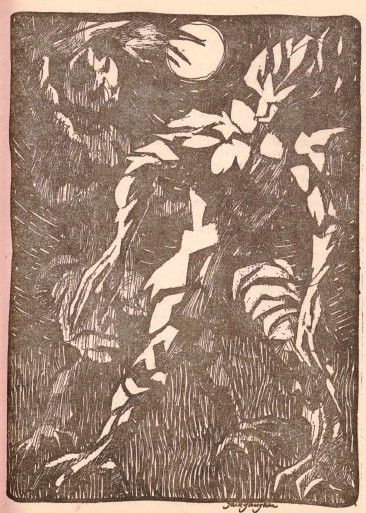
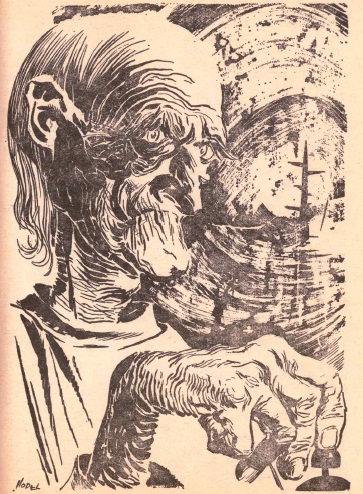
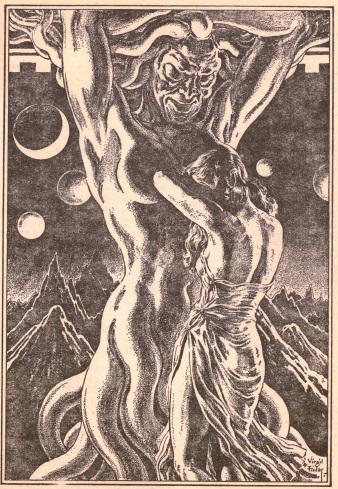
![[July 6, 1964] Busy Schedule (August 1964 <i>IF</i>)](https://galacticjourney.org/wp-content/uploads/2019/07/640706cover-672x372.jpg)

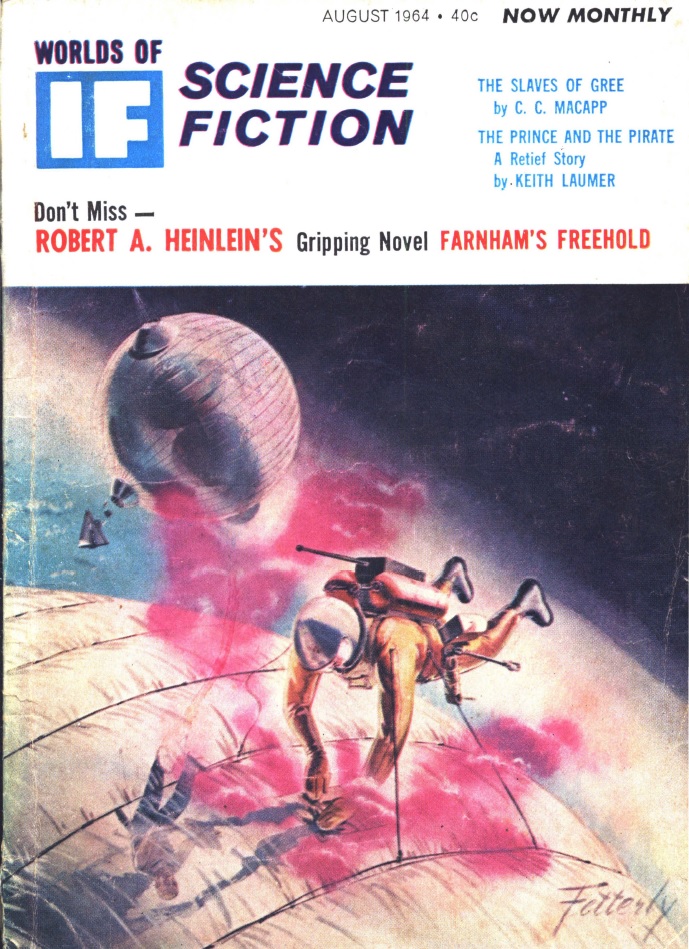
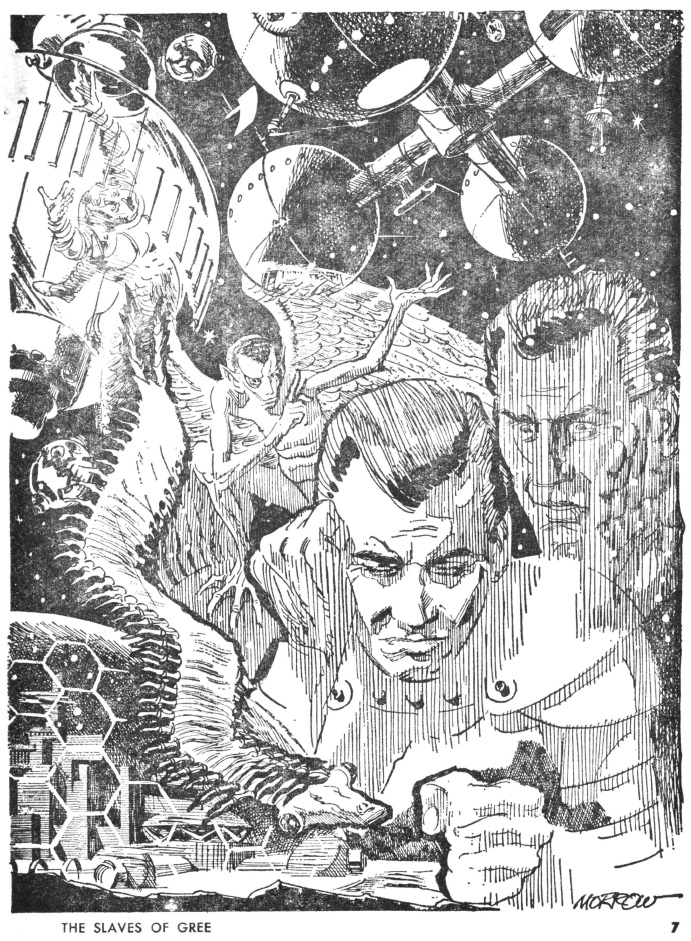
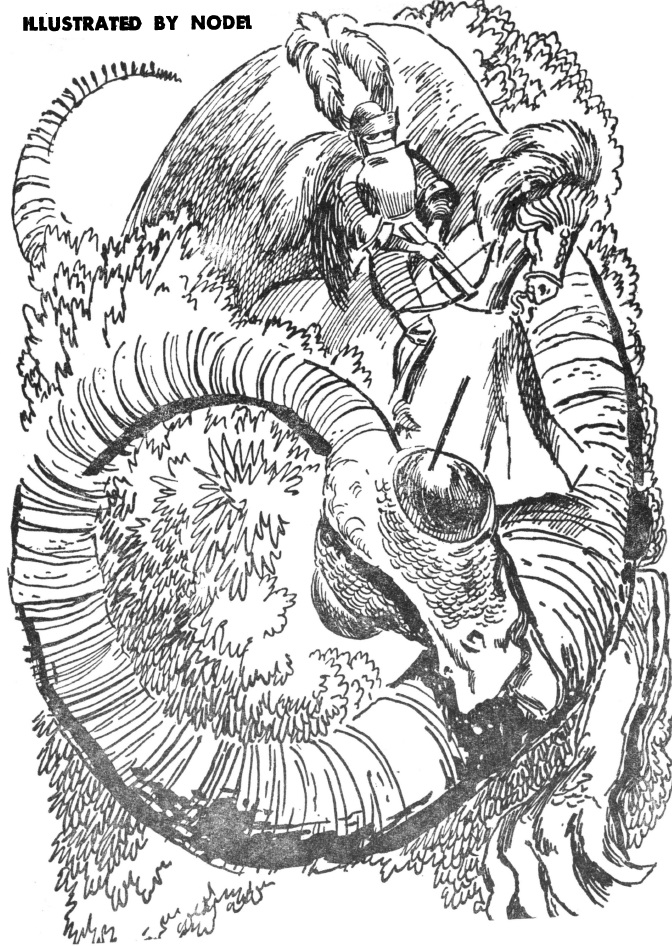
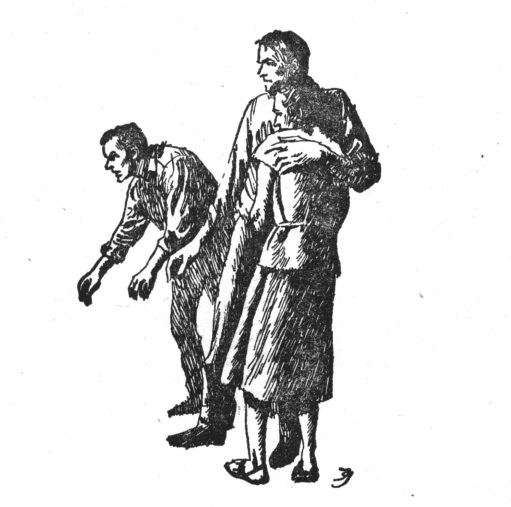
![[June 16, 1964] Strangers in Strange Lands (August 1964 <i>Worlds of Tomorrow</i>)](https://galacticjourney.org/wp-content/uploads/2019/06/6312017cover-672x372.jpg)







![[June 8, 1964] Be Prepared! (July 1964 <i>IF</i>)](https://galacticjourney.org/wp-content/uploads/2019/06/640608cover-672x372.jpg)








![[April 20, 1964] Play Ball! (June 1964 <i>Worlds of Tomorrow</i>)](https://galacticjourney.org/wp-content/uploads/2019/04/640420cover-672x372.jpg)







![[Apr. 6, 1964] The art of word-smithing (May 1964 <i>IF</i>)](https://galacticjourney.org/wp-content/uploads/2019/04/640406cover-672x372.jpg)




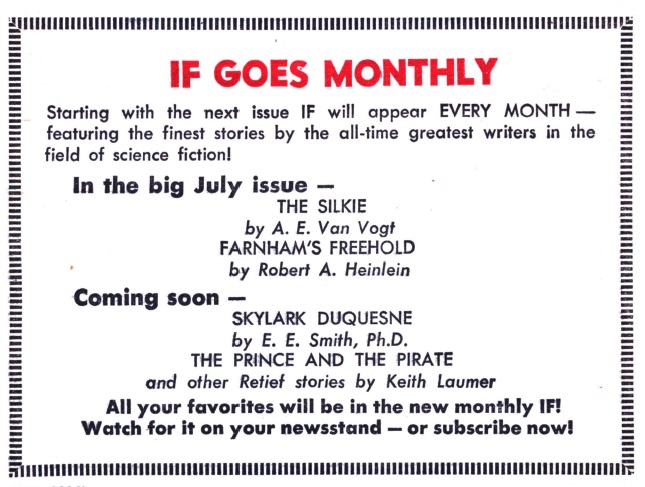
![[March 9, 1964] Deviant from the Norm (April 1964 <i>Galaxy</i>)](https://galacticjourney.org/wp-content/uploads/2019/03/640309cover-672x372.jpg)














